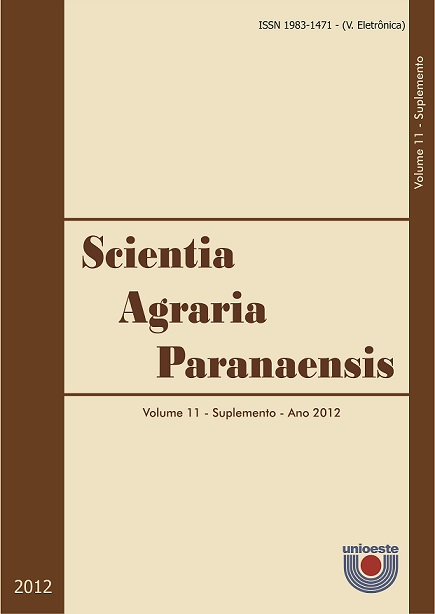Levels of metabolizable energy and digestible lysine for the performance of broiler chicks from 1 to 10 days old
DOI:
https://doi.org/10.18188/sap.v11i0.7870Keywords:
conversão alimentar, ganho de peso, ração pré-inicialAbstract
Trabalho selecionado durante a VI Semana de Ciências Agrárias (VI SECIAGRA), realizada de 01 a 03/10/2012
This study aimed to evaluate the effect of levels of metabolizable energy (ME) and digestible lysine (DL) on the final weight, weight gain, feed intake and feed conversion ratio for broilers from 1 to 10 days old. A total of 1,152 male broiler chicks with an average weight of 55 g were distributed in a completely randomized design with a 4 x 4 factorial arrangement, involving four levels of ME (2700, 2825, 2950, and 3075 kcal.kg-1) and four levels of DL (1.08, 1.187, 1.295 and 1.403%), resulting in 16 treatments with three replications and 24 chicks per experimental unit. The levels of digestible lysine and metabolizable energy acted independently in the performance of broiler chicks in the pre-starter phase, in which the energy levels provided a linear growth (P <0.05) in final weight and weight gain, and quadratic effect (P <0.05) on feed intake and feed conversion. The levels of digestible lysine had quadratic effect (P <0.05) on the final weight, weight gain and feed conversion, and linear growth (P <0.05) on feed intake. The performance results indicate that, for broiler chicks in the pre-starter phase, the level of digestible lysine is 1.27% for greater weight gain and 1.22% for feed conversion, and the ideal level of metabolizable energy for weight gain and feed conversion is 3075 kcal.kg-1.Downloads
Published
How to Cite
Issue
Section
License
Aviso de Direito Autoral Creative Commons
Política para Periódicos de Acesso Livre
Autores que publicam nesta revista concordam com os seguintes termos:
1. Autores mantém os direitos autorais e concedem à revista o direito de primeira publicação, com o trabalho simultaneamente licenciado sob a Licença Creative Commons Attribution que permite o compartilhamento do trabalho com reconhecimento da autoria e publicação inicial nesta revista.2. Autores têm autorização para assumir contratos adicionais separadamente, para distribuição não-exclusiva da versão do trabalho publicada nesta revista (ex.: publicar em repositório institucional ou como capítulo de livro), com reconhecimento de autoria e publicação inicial nesta revista.
3. Autores têm permissão e são estimulados a publicar e distribuir seu trabalho online (ex.: em repositórios institucionais ou na sua página pessoal) a qualquer ponto antes ou durante o processo editorial, já que isso pode gerar alterações produtivas, bem como aumentar o impacto e a citação do trabalho publicado (Veja O Efeito do Acesso Livre).
Licença Creative Commons
Esta obra está licenciada com uma Licença Creative Commons Atribuição-NãoComercial-CompartilhaIgual 4.0 Internacional, o que permite compartilhar, copiar, distribuir, exibir, reproduzir, a totalidade ou partes desde que não tenha objetivo comercial e sejam citados os autores e a fonte.


